
Paradise Blue
Earliest of Morisseau's 'Detroit trilogy' is entertaining period piece
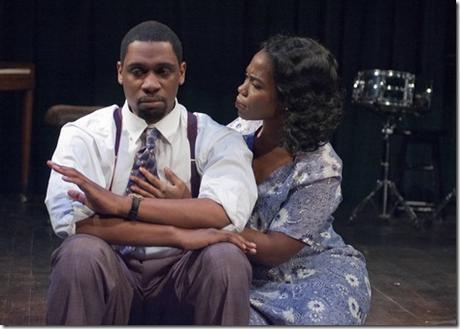
Review by Catey Sullivan
With Paradise Blue , Dominique Morisseau continues using her hometown of Detroit as the setting for dramas seeped in history and music. Set in 1949, Paradise Blue is chronologically the earliest of her "Detroit trilogy," which also includes , (which deals with the race riots of the titular year) and (set in 2008 in an auto stamping plant).
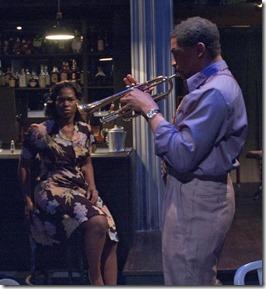
Club owner Blue (Al'Jaleel McGhee) is a trumpeter whose talent and torment are equally intense. He's in talks to sell his beloved bar, a move that would have life-changing consequences for musicians P-Sam (Charles Andrew Gardner) and Corn (Ronald L. Conner). Blue's long-suffering girlfriend Pumpkin (Kristin E. Ellis) would also see her world upended should Blue's secret negotiations end in a sale.
The atmosphere in the club is tense, uncertain and fraught with whispered rumors about Blue's intentions. When a mysterious woman named Silver (Tyla Abercrumbie) sashays into this combustible environment, you can practically smell the fuse starting to burn down to explosion.
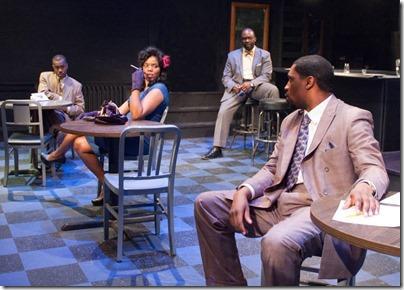
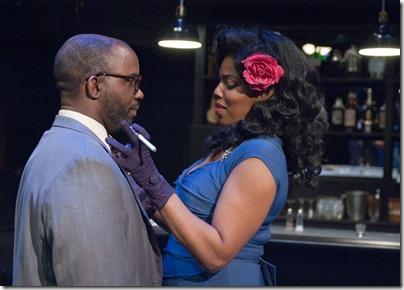
Morisseau's setup hews to the conventions of noir. Blue's ominous moods hang over the club like a veil of cigarette smoke. Silver is as smooth as honey and as dangerous as arsenic. Pumpkin is the good girl-next-door type, an innocent shocked into speechlessness by the very sight of a gun. Percussionist P-Sam is the sort of sweet, trusting, gently naïve type that rarely survives the murderous machinations of the genre. And while Corn is wise to the ways of the world, he too become entangled in a web fraught with lust, greed and distrust.
Despite an effective setup, the problem with Paradise Blue is that the characters never go deep enough. In Blue we see the outward manifestation of significant inner demons - when he's not taking things out on the horn, he's an abusive bully to Pumpkin and the house musicians. But beneath the troubled exterior, there's no sense of where these traits originated.
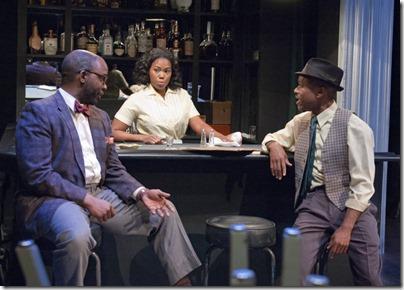
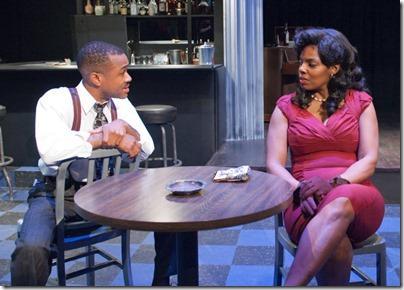
Blue's anger, hostility and abusiveness seems like an affect - an extremely well performed affect, but an affect nonetheless. Pumpkin's allegiance to him even through regular abuse is similarly superficial. And as the smoldering dame who lures all and sundry into her web, Abercrumbie nails the look of a true siren but never really lets anyone see what lies behind Silver's formidable powers of seduction.
The music in the piece is also problematic. Blue expresses his most intensely felt moods by playing the trumpet - something that requires an actor who is also a bona fide trumpet virtuoso. McGhee is serviceable on the horn, but he's not sublime. And sublime is what the script demands. Moreover, the line between his playing and the show's prerecorded music is blunt and obvious. The music in Paradise Blue isn't woven through. It's more of an overlay.
Morisseau's plot starts strong but ultimately fizzles. Despite its early promise, Paradise Blue turns out to be rather formulaic.
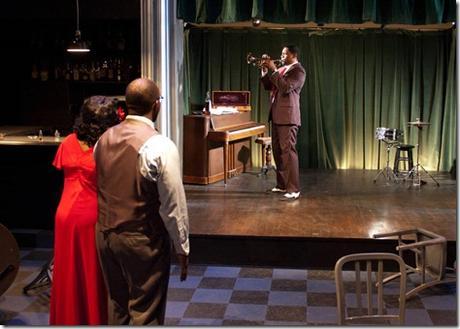
There's a fascinating, important story in Detroit's Black Bottom community, both in its thriving heyday and in the institutionalized racism that erased it. Morisseau starts to tell that story in the early scenes of Paradise Blue . But in the end, all she gives us is an entertaining, but fairly predictable, genre piece.
Paradise Blue continues through July 23rd at TimeLine Theatre, 615 W. Wellington (map), with performances Wednesdays and Thursdays 7:30pm, Fridays 8pm, Saturdays 4pm & 8pm, Sundays 2pm. Tickets are $38-$51, and are available by phone (773-281-8461) or online through their website (check for half-price tickets at Goldstar.com ). More information at TimeLineTheatre.com. (Running time: 2 hours 30 minutes, includes an intermission)
Photos by Joe Mazza and Lara Goetsch
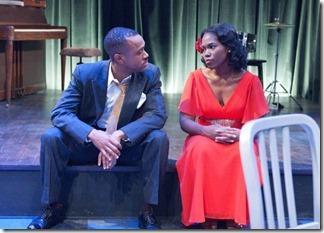
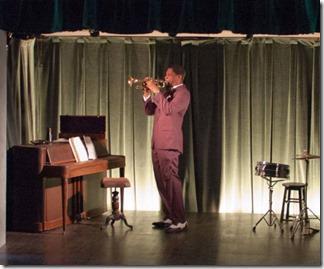
Tyla Abercrumbie (Silver), Charles Andrew Gardner (P-Sam), Ronald L. Conner (Corn), Kristin E. Ellis (Pumpkin), Al'Jaleel McGhee (Blue), Taylor Barfield (u/s Corn), Ti Nicole Danridge (u/s Silver), Bernard Gilbert (u/s Blue, P-Sam), India Gurley (u/s Pumpkin)
behind the scenes
Tags: 17-0502, Al'Jaleel McGhee, Bernard Gilbert, Black Bottom, Brian Sidney Bembridge, Catey Sullivan, Cedar Larson, Charles Andrew Gardner, Chicago Theater, Christine Pascual, Christopher Kriz, Dina Spoerl, Dominique Morisseau, Emily Arnold, India Gurley, Jared Bellot, Joe Mazza, Kristin E. Ellis, Lara Goetsch, Mary O'Dowd, Matt Fayfer, Neal Javenkoski, Orbert Davis, post, Richard Lundy, Ron OJ Parsons, Ronald L. Conner, Sara Thornton, Taylor Barfield, Taylor Lumpkin, Ti Nicole Danridge, TimeLine Theatre, Tyla Abercrumbie

